Movie Review – Ratatouille
Superbly entertaining animated film, directed by Brad “The Iron Giant” Bird and animated so beautifully that not a frame of this elegant film is anything less than perfection. With a cracking story, great characters, and an obvious love of the subject matter, this is most definitely one of the best animated films ever made. Period. This is why animated films continue to amaze us. For results like this.
– Summary –
Director : Brad Bird
Cast : Voices of Patton Oswalt, Lou Romano, Brad Garrett, Peter O’Toole, Janeane Garofalo, Ian Holm, Brian Dennehy.
Year of Release: 2007
Length : 111 Minutes
Synopsis: When a rat discovers the ability to cook, and cook very well, he finds himself swept away through a sewer to the city of Paris, France. There, he befriends a young scullery boy, and together, they begin to return a once proud and successful restaurant to its former glory. But when the head Chef learns that a rat is doing all the cooking, the pair must find a way to ensure they, and the business, are not jeopardized. Not only that, but world-famous food critic Anton Ego lays down a challenge to “knock him out” with a meal of the chefs choosing, the battle is on to ensure the restaurant survives at all.
What We Think : Superbly entertaining animated film, directed by Brad “The Iron Giant” Bird and animated so beautifully that not a frame of this elegant film is anything less than perfection. With a cracking story, great characters, and an obvious love of the subject matter, this is most definitely one of the best animated films ever made. Period. This is why animated films continue to amaze us. For results like this.
********************
Charming Pixar film about a rat who discovers a passion for cooking, and ends up teaming with a young wannabe-chef to help a once-famous restaurant return to it’s former glory. Yes, I said “rat”. After all, that’s the joke of the title, yes? Yes. You’d be forgiven for thinking a film about a rat in a kitchen wouldn’t make for a most appealing film, and in most cases you’d probably be right, slap on the back, give yourself a gold star. But then, this is a Pixar film, and once again the lads at Emeryville have managed to create something that not only sweeps away your preconceptions, it revolutionizes the way animated films can tell a story. Ratatouille is a beautiful, lovely, dramatic story of love, family, and good cooking. In these modern days of weight-watching, fad-diets and overqualified British chefs going around chumming up in squalid US kitchens, it’s refreshing to finally watch a film about food that isn’t either preachy or overly sentimental. And what little sentiment there is, is festooned upon a bed of deep steamed quality and lemon-seasoned style. Ratatouille is a revelatory film, perhaps the first film by Pixar to transcend it’s animated roots and become an honest-to-goodness masterpiece. That’s not to say that Pixar’s previous films have been shoddy or limited, no way. But Ratatouille expands the studio’s ability to take a simple premise and make a terrific film out of it. So we’ve had our fill of talking toys, scary bedroom monsters (that also talk) and fish searching for their family (who also, by the way, talk), but Pixar managed to capture our imaginations with this one, singularly amazing film.
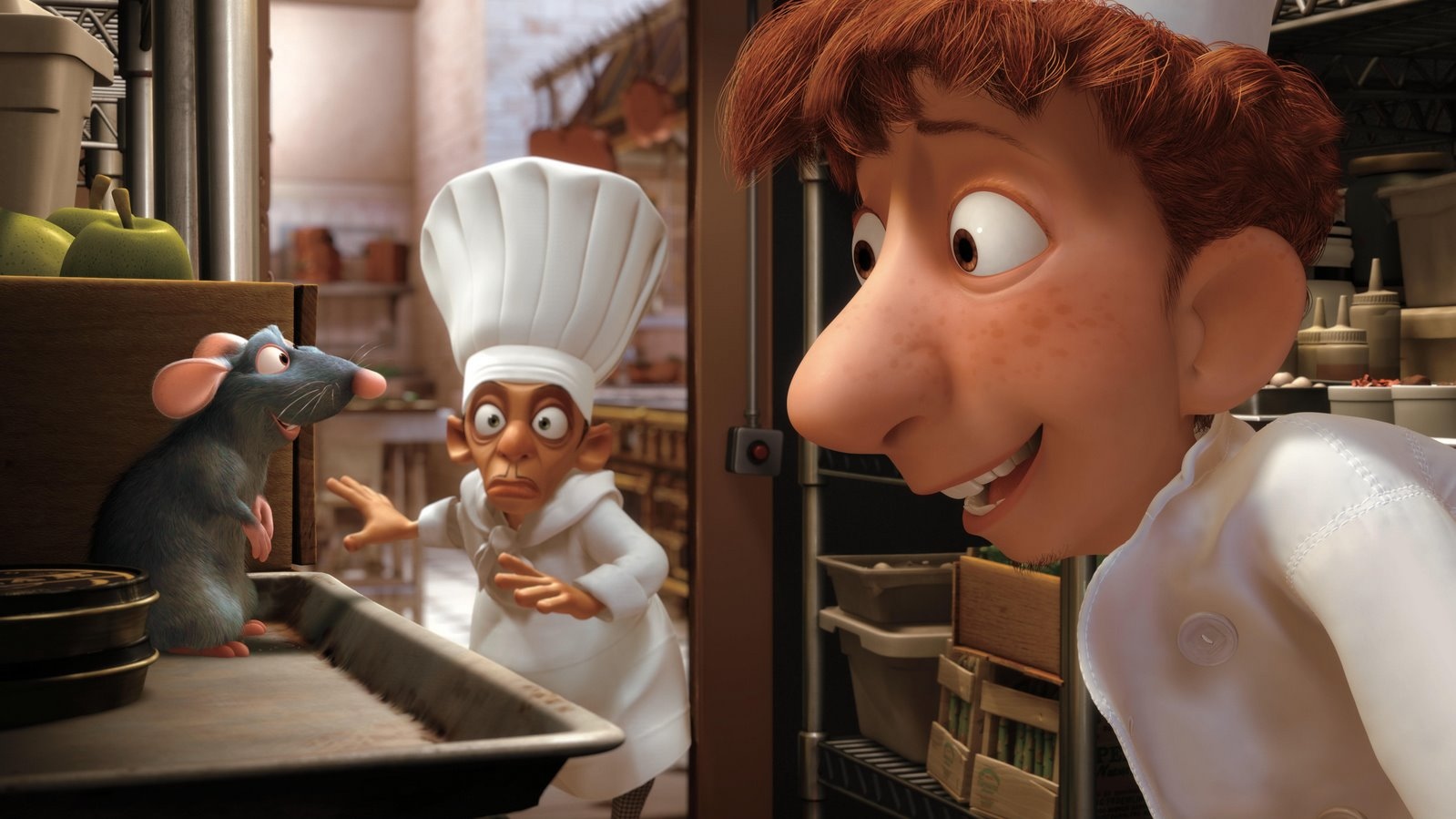
When Remy, a rat who longs to cook and eat food like humans, rather than the scraps his father and their nest often do, finds his way to Paris after an encounter with an all too heavy handed gun-toting old lady, he discovers a way to fulfill his passion with the help of a young plongeur, Alfredo Linguini, who comes to Gusteau’s restaurant at the behest of his mother. Gusteaus was once a 5 star restaurant, until the owner served critic Anton Ego with sub-par food, and was given a poor review, before succumbing to death from sorrow shortly afterwards. The restaurant, now run by Gusteau’s former sous Chef Skinner, has become a shell of it’s former self, with Skinner using the brand of Gusteaus as a way of selling pre-packaged ready-meals that are nowhere near the quality expected of fine restaurant dining. Alfredo, who has as much cooking experience as a spasmodic conniption, becomes Gusteaus new garbage boy when he arrives to begin work, his mother having sent him as she was once the late Gusteau’s former mistress, and felt he owed her that much. When Remy accidentally saves a botched soup from being a total disaster, the rest of the kitchen blames Alfredo. Skinner, quick to disdain the new employee, gets him to make it again to prove it was no fluke, and so Remy and Alfredo team up to surprise and shock the culinary world with their skills. Skinner, who discovers a shocking secret about Alfredo, which means his control of the restaurant is soon to be lost, is the only person who suspect that a rat is actually doing all the work, while the rest of the kitchen’s staff are unaware. However, through a series of subterfuges, Alfredo and Remy keep their secret safe. Fellow kitchen worker Colette, finds a kinship with Alfredo, and slowly but surely falls in French-love with him.
As in any film, drama and conflict are the key components to any good film, and it stands to reason that eventually, Remy’s secret will be out, and his time in a kitchen (usually not a great place to find a rat) will soon be up. Plus, Alfredo’s inability to cook will put him in direct conflict with Anton Ego, who once again deigns to step into the once-famed restaurant to critique a dish. I won’t give the story away for those of you who haven’t seen this marvelous film, but Ratatouille skirts both slapstick and genuinely emotional humor with both skill and grace. The film manages to remain true to it’s core values of family and acceptance, of being who you are and nothing less, without sacrificing logic (as long as you can look past a talking, cooking rat) or character development. Pixar’s tenet as long as the company has produced feature films has been a dedication to truth in storytelling, and that has never been more pronounced than here in this film. Remy, the central character of Ratatouille, is not blessed with super-powers, not is he the sombre-anti hero or the put-upon klutz who finds his way in life eventually. Remy is, to be honest, perfectly ordinary rat with one special gift: the ability to smell and distinguish different foods, and to emulate the great chefs of the world. His dream, is rats can have dreams, is to find a way to meet his idol Chef Gusteau, who as we learn quite early on in the film, is now dead. Sounds like a bummer, but it opens the film up to so many narrative elements of character development that it’s hard to know where to start. Remys father, who is a little like a Godfather figure in their rat nest (leading his clan like an Italian mafia don) thinks that a rat’s place in life is to be hunter by humans, killed and destined to forever scrounge the garbage skips of the world. He’s not entirely unhappy with that scenario, although we know he knows no better, and is therefore ignorant of his potential. So when Remy sneaks into an old ladys home (with his brother, Emile) and describes his life’s wish, neither Emile nor his father are impressed. But due to a shotgun-inspired run-in with the old lady, and the occasion of a thunderstorm, Remy is washed down a sewer and away from his family.
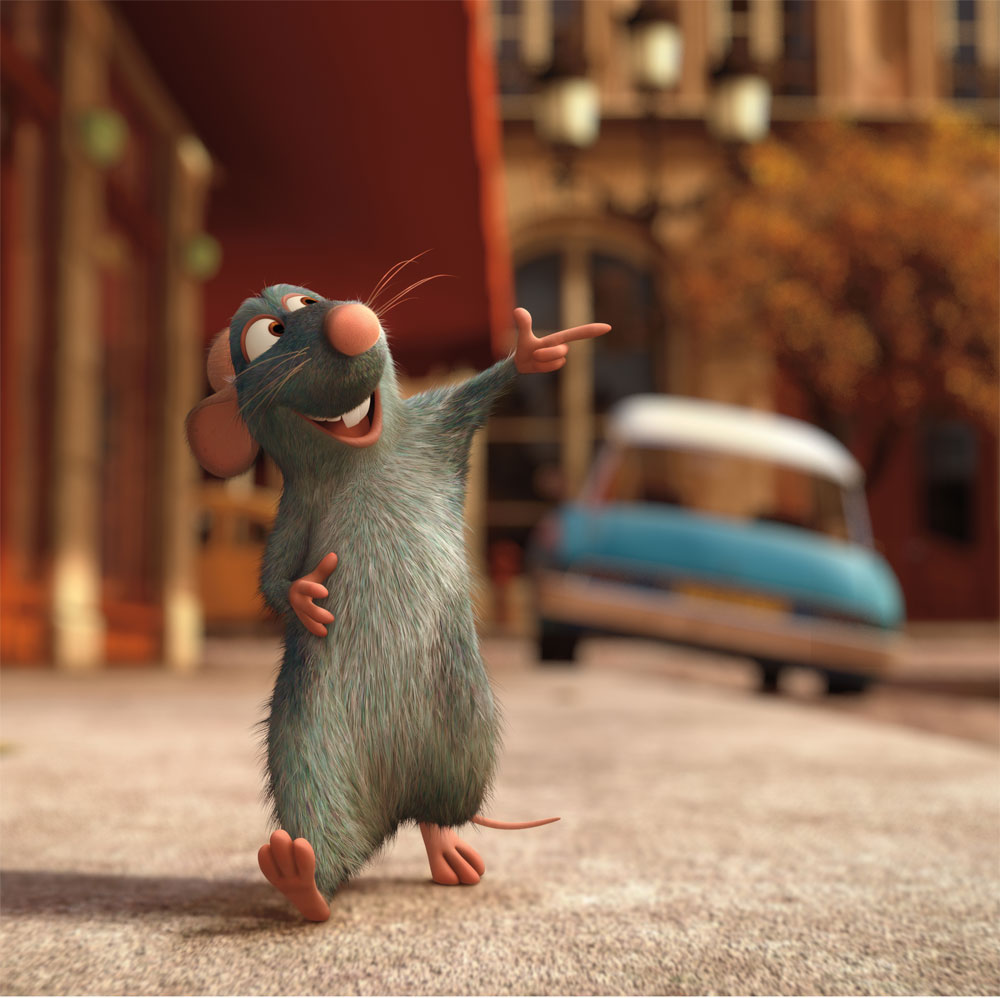
Remy is a likeable hero, for a rat, who not only manages to remain cool under pressure (like the time he has to skit around the kitchen without being discovered to rescue the aforementioned soup) but also has a passion for his craft, even though by all accounts he shouldn’t. He’s the Everyman character here, and while it may seem a little unappealing to connect emotionally to a rat, the core strength of the story, and perhaps the entire film, is that we do feel for Remy’s plight, because although we don’t all want to be French chefs, we do all aspire to do something we have a passion for, and that’s the part that connects with us, the viewer. Remy represents the underdog, the one who is always told “it cannot be done” or “it should not be so”, and yet tries and tries to do just that. Patton Oswalt, whom for most Australian audiences is best known for appearances in films like Starsky & Hutch, Failure To Launch, Balls Of Fury and Observe & Report, none of which gave him A-list status here, does a tremendous job of reserving his usual stand-up shtick for an emotional, surprisingly deep vocal portrayal of Remy. Through him, and some wonderful animation (more on that later) we find ourselves growing fond of Remy and his rat-problem, and by the end of the film even find ourselves looking at rats in a new, more enlightened, light.
Alfredo, voiced by Pixar production alum Lou Romano, is a revelation. Usually found as a designer or production staffer on Pixard productions, here he landed the task of actually voicing a lead character in one of their films. Romano brings just the right balance of downtrodden soulfulness to the character, less of an idiot and more of an accident prone, self-esteem-lacking adolescent who appears for all the world like a wide-eyed kid lost in a big-ol’ world. There’s the frustration at not being able to cook, when his mother forces him to go work at a kitchen of a famous restaurant; the frustration at falling for the only female worker in the kitchen and not being able to form coherent sentences around her,; and of course the frustration at always being overlooked by those in power as a mere obstacle to be trodden on rather than nurtured. Romano manages to encompass all this simply in his voice work, which I have to say, is first class and a credit to director Bird for seeing and using. Alfredo’s female love interest, Colette, is given voice by an almost incomprehensible Janeane Garofalo, who is so unrecognizable in her craft here that I didn’t actually believe the credits until I’d scanned them on IMDB. Colette is the archetypal French woman, passionate, angry, sensitive and caring, usually in that order; her relationship with Alfredo seems a little forced at first, but eventually becomes believable by films’ end.
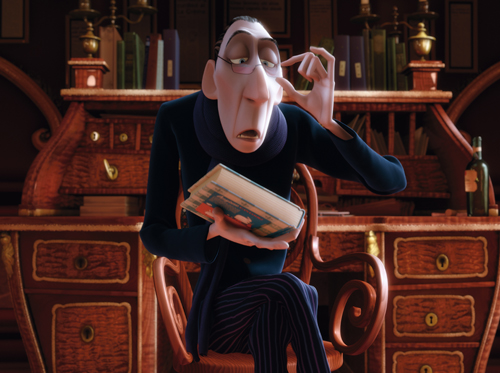
Brilliant vocal turns from Ian Holm as the Gusteau’s short-statured owner Skinner, and Brad Garret as the ghost of the late chef himself, who turns up to instruct Remy like a fat, Santa Claus-esque Yoda, only add to the depth of character that this film contains. However, the master-stroke of brilliance from director Brad Bird is the casting of Peter O’Toole as Anton Ego, the tall, thin, arrogant food critic who torments all restaurant managers across Paris, and who, with a word, can destroy a career. O’Toole steals every scene he’s in as Ego, his rapier-like insults and scheming, “I control your world” penchant for looking down upon folks he encounters only adding to his antagonistic nature. He’s the very antithesis of a critic, somebody who delights in tearing down the work of somebody offering theirs up to public scrutiny. Ego’s finale speech, delivered upon the realization that he could be, nay, is, wrong, is spectacular in it’s double meaning: it reeks of Brad Bird sticking it to all those who decry the work of others in a simple and narcissistic manor. Perhaps a backhanded slap to film critics in general, even if the intent is about all critics. Still, Anton Ego is a wonderful villain for this film, even though he’s barely in it. The chief villain of Ratatouille is Skinner, whose Napoleonic tendencies lead him into a paranoid, deluded quest to uncover the truth about Alfredo’s partnership with a rat, which leads to his ultimate undoing. It’s Holm’s hissing, snarling performance that typifies his range as an actor: to go from Bilbo to this is a startling leap.
However, the real star of Ratatouille isn’t really the excellent vocal performances. It isn’t the wonderfully layered and carefully conceived storyline. It isn’t even the magnificent score from composer Michael Giacchino (who also worked with Brad Bird on The Incredibles, and on Pixar’s recent cinematic treat, UP!) which perfectly captures the essence and tone of the film and it’s setting; Paris. No, the real star (for me) of this film is the animation and production design. Ratatouille looks like no other film before it, in terms of it’s cinematic style and the way the animators have brought Paris to life. I’ve been to Paris, and while I can say that the film relies perhaps too heavily on the iconic Eiffel Tower to seal it’s geographical location, this is the Paris I want to go back to. From sunrise to gloriously hued sunset, this Paris is a postcard to romance and fine dining. Somehow, Paris truly is the gastronomical centre of the Universe, and having eaten at a few of the cafe’s around the Parc Du Champs De Mars and Rue de Bercey, I can attest to the fact that people in Paris look the way they do for a reason: their food is frickin’ awesome. Ratatouille nails this perfectly. The realism of the set design and backgrounds, the vast Parisian night-life vistas and the more intimate and peasant-inspired loft-living of Alfredo, to the garbage strewn sewer of Remy’s family, to the as-you’d-imagine-it encapsulation of the ultimate French kitchen; every nuance and moment in this films’ delivery is stunningly perfect. The lighting, the texturing, the motion of the characters: this is animated perfection folks, and I haven’t seen better detail than this in a long, long time. This is the kind of thing that makes those poor folks at Dreamworks Animation and Blue Sky Studios flagellate themselves in anguish that they aren’t able to emulate in an entire film the level of quality Pixar put into one minute of theirs.
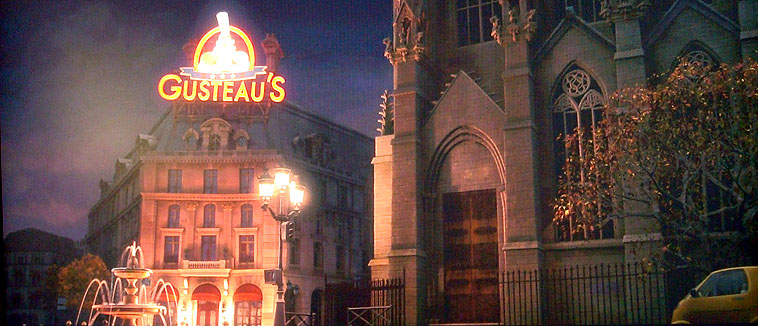
Every ounce of this films design reeks of technical perfection, the shadows, the lighting, the sound and music, all combining for one of the most complete visual and aural experiences I’ve had in a long time. The sound of cooking food, the clatter of plates and the hum of chatter in the dining room of the restaurant, coupled with the lovely ambient effects used throughout the film generally, make Ratatouille a delight for any film fan to enjoy.
While the exact location of Gusteau’s restaurant is a little hazy, in terms of it’s position within Paris; the restaurant appears to be near the river Seine, although far enough away from the Eiffel Tower to afford the iconic horizon shot we all associate with the City of Love, so I suggest that perhaps it’s somewhere in the region of Courbevoie, or maybe even further north along the Rue de Maréchal Joffre. It’s not the most important part of the film, and Pixar’s team of designers have kept the exact location of the restaurant deliberately obscure, but it’s fun to try and figure out where it is.
It seems that there are never enough superlatives in the English language to convey the delight of watching a Pixar film, and to this date they still haven’t dropped the ball in terms of quality and consistency. With Ratatouille, they’ve taken a premise that many scoffed at originally, and turned it into one of the most memorably uplifting and entertaining films ever made. A true delight in every sense, Ratatouille should be mandatory viewing for any aspiring film-maker. A singular delight, a wonderful love-letter to food and cooking, and a genuinely children-of-all-ages viewing experience. Brilliant.

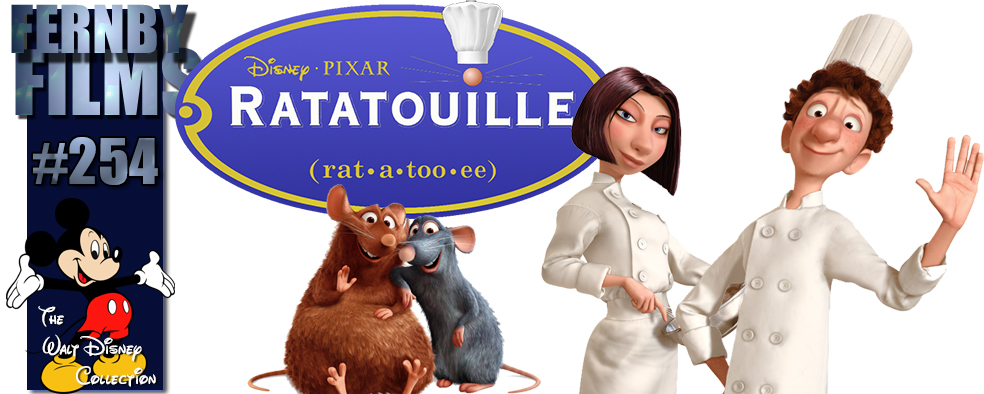


 Monsters University Review
Monsters University Review

